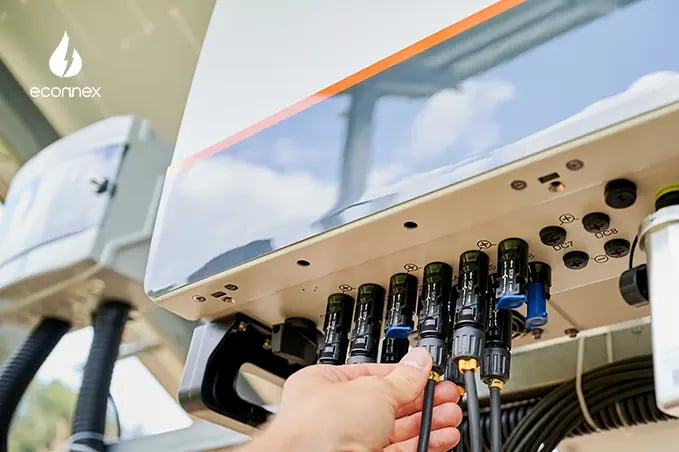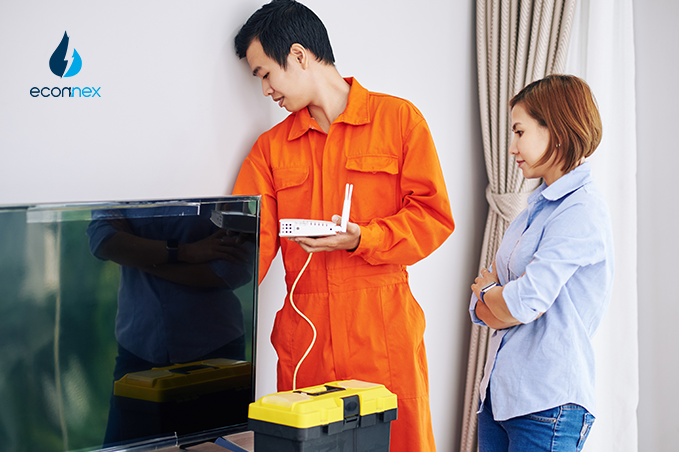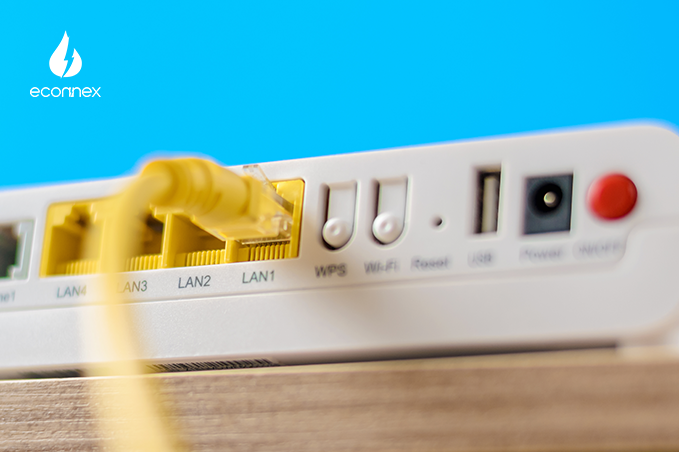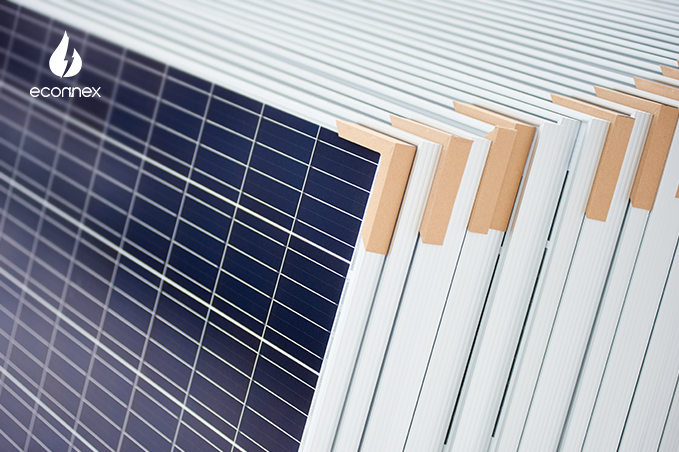The conversation around solar energy has taken an exciting turn in Australia in recent years. The advent of solar battery storage systems has transformed the solar industry, making energy storage more accessible and affordable for homeowners.
This revolution began in earnest in 2015 when Tesla announced its first Powerwall, catalysing interest and competition in the market. Today, solar batteries allow households to store excess solar power for use at night, ensuring greater energy independence and providing essential blackout protection.
Today, Econnex Comparison is here to help you compare several solar options available for your address, complete with a battery, to help you commence your journey into renewable green energy.
Benefits of Solar Battery Storage Systems
Implementing solar battery storage systems has two primary benefits: greater energy independence for your household and the potential for long-term savings. Let’s explore these further.
- Energy Independence and Blackout Protection - One of the primary advantages of solar battery storage is the increased energy independence it offers homeowners. By storing excess solar energy generated during the day, households can use their own electricity at night, reducing reliance on the grid. This is particularly advantageous during power outages, as a properly configured system can provide uninterrupted power, making it an essential component of home energy resilience.
- Financial Savings - Another significant benefit is the potential for savings on electricity bills. Solar batteries enable homeowners to maximise the use of their solar-generated electricity, minimising the need to buy electricity from the grid, which is often more expensive. This can lead to considerable cost savings over time, especially as electricity prices rise.
Factors to Consider Before Purchasing a Battery Storage System
Investing in solar battery storage systems is a significant decision that requires careful consideration of several key factors:
- Money - The upfront cost of solar battery storage can be substantial, and the payback period varies based on electricity usage, the size of the solar system, and battery storage capacity. Calculating the expected savings and weighing them against the initial investment is essential. Rebates and incentives, such as those available through Virtual Power Plant (VPP) programs, can improve the economics of a battery system and should be considered in any cost-benefit analysis.
- Brand and warranty - Choosing a reputable brand is crucial, as it affects the reliability and performance of the battery storage system. Warranties vary significantly between manufacturers, so it's vital to select a product with a solid warranty that offers peace of mind over the system's lifespan.
- Virtual Power Plants (VPPs) - VPPs offer an innovative way to enhance the value of solar batteries. By connecting your battery to a VPP, you can contribute excess energy to the grid in exchange for financial benefits. However, this can also increase the wear on your battery, potentially affecting its longevity.
Know More - How to Choose Solar Battery
Choosing the Right Solar Battery for Your Home
There are several factors to weigh up when choosing a solar battery storage system for an Australian home or business. Each consumer’s needs are different, and everyone has their own unique set of financial circumstances. Generally speaking, these are some of the things to consider:
- Size and capacity - The size and capacity of the solar battery you need depend on your household's energy consumption patterns, especially during the evening and night. A general recommendation is to opt for a system with enough capacity to meet your nighttime energy use, ensuring that your home can run off the battery until the sun rises again.
- Battery components - While Lithium-ion batteries are the most popular choice due to their efficiency, longevity, and relatively compact size, it's essential to consider all available technologies. Although older and requiring more maintenance, lead-acid batteries may offer a lower upfront cost. Flow batteries, another alternative, provide unique benefits for specific applications.
- Installation considerations - Installing a solar battery system involves several considerations, including location, safety requirements, and the battery's compatibility with existing solar PV systems. Installation costs can vary widely based on these factors, so obtaining detailed quotes from reputable installers is crucial.
Solar Batteries Costs
Several factors, including the battery's capacity and technology, the complexity of the installation, and any additional features such as backup power capabilities, influence the cost of solar batteries in Australia. Rebates and incentives can significantly reduce upfront costs, but it's important to understand the total investment required, including any ongoing maintenance costs.
Some of the critical factors influencing solar battery cost include:
- Purchase price - The purchase price of solar batteries in Australia can vary widely, typically ranging from AUD 5,000 to AUD 15,000. This variance is due to several factors, including the battery's capacity (measured in kilowatt-hours, kWh), the technology type (e.g., lithium-ion, lead-acid), brand reputation, and any additional features like integrated inverters or smart management systems.
A higher-capacity battery, while more expensive, can store more energy, potentially increasing your ability to offset your energy consumption from the grid. The choice of capacity should be based on your household's energy consumption patterns and the size of your solar PV system.
- Installation Costs - Installing a solar battery system typically requires professional installation, which can add an additional AUD 1,000 to AUD 3,000 to the overall cost, depending on the complexity of your solar power system and the specific requirements for the battery installation. Prior to installation, a detailed site assessment may be necessary to determine the optimal placement for the battery and to ensure that your current electrical system can accommodate the new addition. This assessment can also contribute to the installation costs.
- Maintenance Fees - Most modern solar batteries, particularly lithium-ion batteries, are designed to be low maintenance. However, periodic checks and occasional updates to the system's software may be required.
- Longevity and Replacement Costs - The lifespan of a solar battery typically ranges from 10 to 15 years, depending on the brand, technology, and how frequently the battery is cycled. Considering the potential need for replacement during the lifetime of your solar power system is vital for long-term financial planning.
- Potential savings and incentives - By storing surplus solar energy for use during peak times, solar batteries can significantly reduce your reliance on the grid, leading to substantial savings on your energy bills.
- Government incentives - The Australian government and some state governments offer incentives and rebates for installing solar batteries, which can reduce the upfront costs. If you want to optimise the benefits of your solar system, it is important to research and apply for any available incentives in your area.
Explore - Korean Solar Panels
Common Pitfalls and How to Avoid Them
There are a few common mistakes that Australian consumers make when sourcing a solar system and exploring their options for a battery. An easier way to do it is to use Econnex Comparison, which helps Aussies compare options from our reputable panel of installers to find a suitable option. That said, here are a few things to keep an eye out for:
- Misleading sales tactics - The excitement around solar batteries has led to the emergence of some misleading sales practices from corners of the market. Thankfully, Econnex Comparison only deals with Tier 1 solar providers, helping to ensure that you get a product that genuinely works. Some sellers may promise unrealistically high savings or underquote the system size needed to achieve $0 electricity bills. It's crucial to approach such claims with scepticism and conduct thorough research. Always seek quotes from multiple reputable providers and check independent reviews and testimonials.
- Backup power levels - It is essential to understand the level of backup power a solar battery system can provide. Some systems offer minimal backup, powering only a few critical circuits, while others can power an entire home. Discuss your backup power needs explicitly with your installer to ensure your system meets your expectations.
- Location and Safety - To ensure safety, strict regulations govern the installation location of a solar battery. Batteries must be installed in well-ventilated, accessible areas away from direct sunlight and heat sources. Compliance with these regulations is crucial to prevent overheating and to ensure the system's longevity.
- Compatibility and costs - Ensure your solar battery is compatible with your existing solar PV system (if you have one), especially if you're not installing a new system. The costs involved in retrofitting a battery can vary, so it's helpful to understand the total expense, including any necessary upgrades to your current system.
Compare, Select and Power Up with Econnex Comparison
Solar battery storage systems represent a significant advancement in home energy management, allowing Australian households to enhance their energy independence, protect against blackouts, and achieve considerable savings on electricity bills. However, navigating the market requires careful consideration of the system's size, technology, installation specifics, and costs involved.
Conducting thorough research and seeking expert advice is crucial for those considering making the leap into solar battery storage systems. With a myriad of options available, finding the right system that fits your energy needs and budget can be daunting.
This is where Econnex Solar Comparison comes into play. Econnex offers a comprehensive platform to compare different solar battery options, helping you make an informed decision based on your specific requirements. By leveraging Econnex, you can explore a range of products and get quotes from trusted suppliers, ensuring you find an appropriate solution tailored to your home's energy needs.
As the solar battery market evolves, staying informed and choosing wisely will ensure you maximise your investment. Embrace the future of home energy with confidence by making an informed decision on solar battery storage systems with the help of Econnex Solar Comparison.




